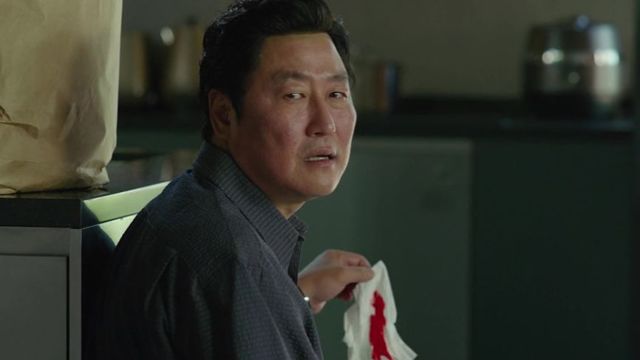Parasite.
A perfect glaze built upon elegant layers of refined chaos.
It’s the sort of cinematic experience that should be a contender for any film award. Director Bong Joon Ho‘s ability to deliver a visual story populated with characters able to deliver such an experience to the world is more than worthy of the mountain of awards thrown in his arms.
So many celebrations of artistic finery. So many wins that I see a family cluttered in a half-basement apartment.
Of course I think you should see it. Who cares if you have to read subtitles? You can still follow the symbology holding the story and themes in place.
Is it dark? Without a doubt. There’s a thin ray of hope still present, one I suspect most people have missed.
One way you can see a direct change is to look for contrasts in a single element between where things start, where they go, and where they conclude. The Kim Family home is a great example. How dirty or clean or cluttered or chaotic is this apartment? How is it similar to the house where the Park Family lives? The more you know about Parasite, the harder it is to give an easy answer to these questions. I won’t do so here. Catch me directly if you want that discussion.

Many want to explore Ki-taek’s actions during the climax, where he sides, how he reacts. Where he goes. Rather than pull apart those results, let me take you on a different voyage. Everything he does—everything we all do—is driven by empathy.
Who we care about will always make us act.
Who we see ourselves in can draw us out of our normal comfort zone.
Anyone who violates those things will look like an enemy to our hearts.
This is why people build hatred and prejudice. It’s the same thing that turns one from reserved pleasantries to racial strife or class warfare.
Rather than pulling on spoilers, here’s a view into a similar emotional experience I confronted in 2015.
I’d come down with a nasty sinus infection, the worst illness that had taken me since I was young. I was sick enough to take off from work and go to the emergency room. The doctor prescribed me the strongest syrup he could prescribe without admitting me. One spoonful, and I would sleep for six to eight hours. I had to take this twice a day.It wasn’t the best medicine for operating a forklift, especially when I only got three 15-minute breaks through the day. No lunch in addition to that, just those slight breaks.
Those facts didn’t heal me enough to work. They left me in a scenario where I could go without medicine and function poorly or I could take the medicine and try to work through extreme drowsiness or I could take the medicine at home and rest. I picked the third option, which favored my health over everything else. The second option put me and my work at risk. The first option only favored my employer.
I left. They called within minutes with the ultimatum to return to work or lose my job.
I don’t work there anymore.
All those reactions follow the same set of rules. I supported who I cared about, even if it meant leaving myself open to being fired for an illness.
I saw my former employer as an enemy after that, just as they looked at me the same way. When I requested unemployment, my former employer petitioned to block it. I spoke with a trusted attorney to find legal retribution. There was none. I fought the unemployment block and won.
That was only a single battle. Even as I’ve improved my situation in the time since then, as a society, we’ve continued to lose.
All too often, we are left alone in a dark room to contemplate how we can rise by playing someone else’s game.